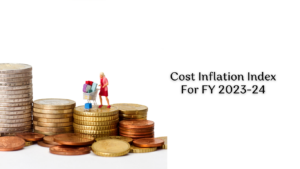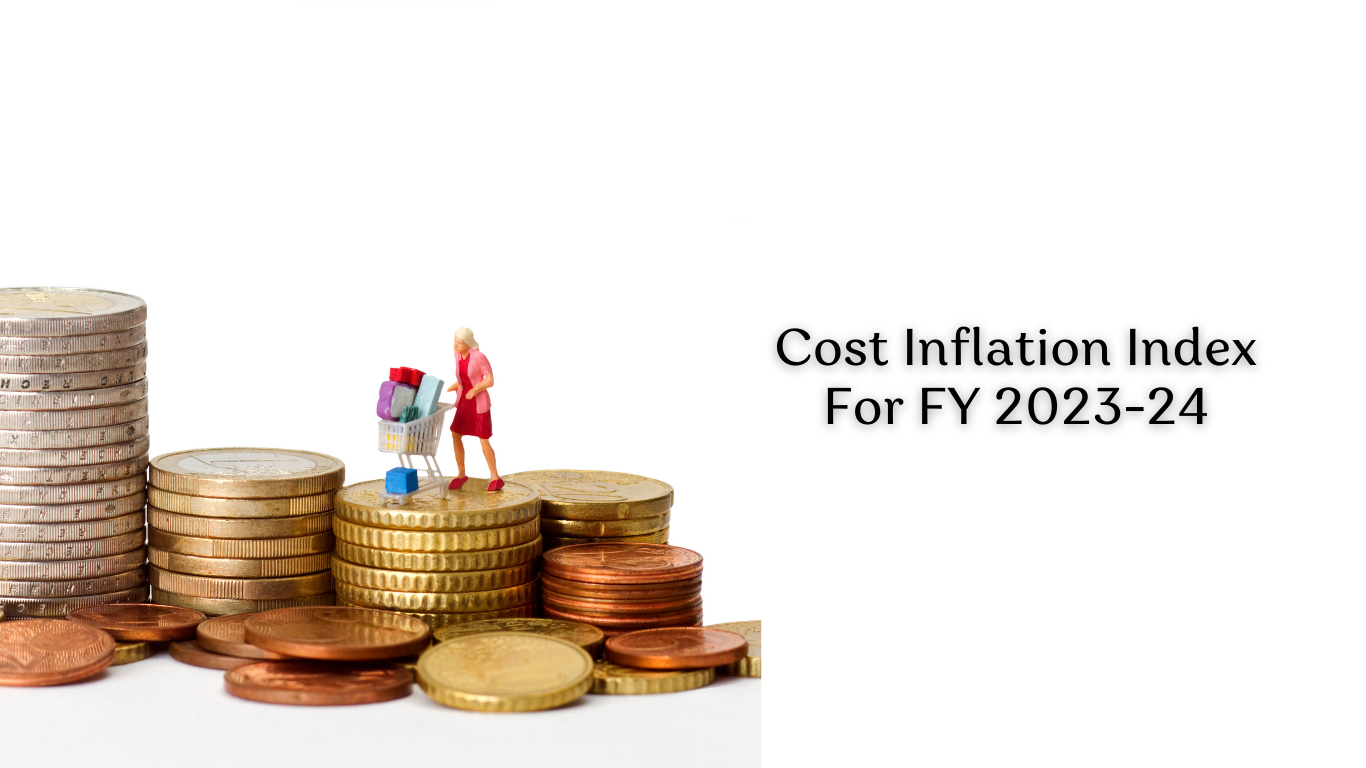Cost Inflation Index For FY 2023-24
Over time, the prices of goods tend to rise, leading to a decrease in the purchasing power of money. For instance, if today you can buy two units of goods for Rs 100, tomorrow you might only be able to purchase one unit for the same amount due to inflation. To estimate this increase in prices year by year, the Cost Inflation Index (CII) is utilised.
The Cost Inflation Index (CII) for the f.y. 2023-24 stands at 348.
What is the Cost Inflation Index?
A Cost Inflation Index table is employed to compute the long-term capital gains resulting from the transfer or sale of a capital asset. Capital gain denotes the profit derived from the sale or transfer of any capital asset, including land, property, stocks, shares, trademarks, patents, and similar assets.
Long-term capital assets are usually recorded in books at their original cost price. Consequently, even though the value of these assets may increase over time, they cannot be revalued.
Consequently, upon the sale of these assets, the profit or gain realized from them tends to be significant due to their elevated sale price compared to their acquisition price. Consequently, taxpayers are required to pay higher income tax on the gains derived from these assets.

Over time, utilising the Cost Inflation Index for capital gains adjusts the purchase price of assets according to their sale price, leading to reduced earnings and a decreased tax liability.
Cost Inflation Index Table from FY 2001-02 to FY 2023-24
| Financial Year | Cost Inflation Index (CII) |
| 2001-02 (Base year) | 100 |
| 2002-03 | 105 |
| 2003-04 | 109 |
| 2004-05 | 113 |
| 2005-06 | 117 |
| 2006-07 | 122 |
| 2007-08 | 129 |
| 2008-09 | 137 |
| 2009-10 | 148 |
| 2010-11 | 167 |
| 2011-12 | 184 |
| 2012-13 | 200 |
| 2013-14 | 220 |
| 2014-15 | 240 |
| 2015-16 | 254 |
| 2016-17 | 264 |
| 2017-18 | 272 |
| 2018-19 | 280 |
| 2019-20 | 289 |
| 2020-21 | 301 |
| 2021-22 | 317 |
| 2022-23 | 331 |
| 2023-24 | 348 |
How is the Cost Inflation Index used in Income Tax?
Long-term capital assets are documented in books at their original cost price. Despite inflationary pressures, they are maintained at this cost and are not subject to revaluation. Cost Inflation Index For FY 2023-24 Consequently, upon their sale, the profit margin remains elevated due to the higher sale price relative to the initial purchase price. This, in turn, results in a higher income tax liability.
The application of the cost inflation index to long-term capital assets leads to an increase in the purchase cost, thereby reducing profits and lowering taxes for the benefit of taxpayers. This adjustment with the cost inflation index benefits taxpayers by increasing the purchase cost of long-term capital assets, subsequently reducing profits and tax obligations.
What is the concept of the base year in the Cost Inflation Index?
The base year marks the inception of the cost inflation index, with an index value set at 100. Subsequent years’ indices are compared to this base year to determine the inflation percentage increase. Cost Inflation Index For FY 2023-24 For capital assets acquired prior to the base year of the cost inflation index, taxpayers have the option to consider the higher value between the actual purchase cost or the Fair Market Value (FMV) as of the first day of the base year. Cost Inflation Index For FY 2023-24 Indexation benefit is then applied to this calculated purchase price. The FMV is determined based on a valuation report provided by a registered value.
Why is the Cost Inflation Index calculated?
The Cost Inflation Index is computed to align prices with the inflation rate. In simpler terms, as the inflation rate increases over time, prices also tend to rise.
Who notifies the Cost Inflation Index?
The Central Government determines the cost inflation index by officially announcing it in the gazette. The Cost Inflation Index is calculated as 75% of the average increase in the Consumer Price Index (urban) for the preceding year. Cost Inflation Index For FY 2023-24 The Consumer Price Index compares the current prices of a basket of goods and services, which represent the economy, with the costs of the same basket of goods and services in the previous year to ascertain the price increase.
Why is the base year of the Cost Inflation Index changed to 2001 from 1981?
Initially, the base year for the Cost Inflation Index was set as 1981-82. However, taxpayers encountered difficulties in valuing properties purchased before April 1, 1981, and tax authorities faced challenges in relying on valuation reports. Cost Inflation Index For FY 2023-24 Consequently, the government opted to shift the base year to 2001 to facilitate swift and accurate property valuations.
Therefore, for a capital asset acquired prior to April 1, 2001, taxpayers have the option to consider the higher value between the actual cost or the Fair Market Value (FMV) as of April 1, 2001, as the purchase price and avail the benefit of indexation. Cost Inflation Index For FY 2023-24 Further details regarding the benefits of the change in the base year can be found here.
How is indexation benefit applied to long-term capital assets?
When the indexation benefit is applied to the “Cost of Acquisition” (purchase price) of the capital asset, it transforms into the “Indexed Cost of Acquisition.”
Points to Ponder
- In the case of property received through a will, the Cost Inflation Index (CII) for the year in which the property is received must be used, disregarding the actual purchase year of the property. Cost Inflation Index For FY 2023-24 Improvement costs incurred before April 1, 2001, are to be ignored.
- Indexation benefit is not permitted for bonds or debentures, except for capital indexation bonds or sovereign gold bonds issued by the Reserve Bank of India (RBI).
- As of April 1, 2023, indexation benefit is no longer available for Debt Funds.
Conclusion:-
In conclusion, the guidelines stipulate that for property acquired through a will, the Cost Inflation Index of the year of inheritance should be used, disregarding the actual purchase year. Cost Inflation Index For FY 2023-24 Improvement costs prior to April 1, 2001, are disregarded. Indexation benefit is restricted for bonds and debentures, except for specific bonds issued by the Reserve Bank of India. Additionally, starting from April 1, 2023, indexation benefit is not applicable to Debt Funds.
Sources :https://cleartax.in/s/cost-inflation-index
For More Information : https://taxgyany.com/

